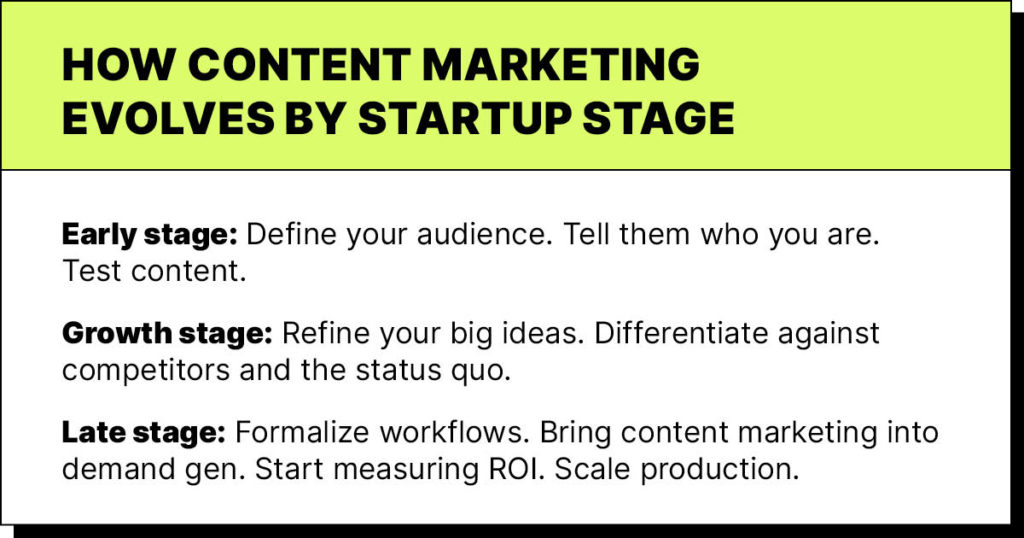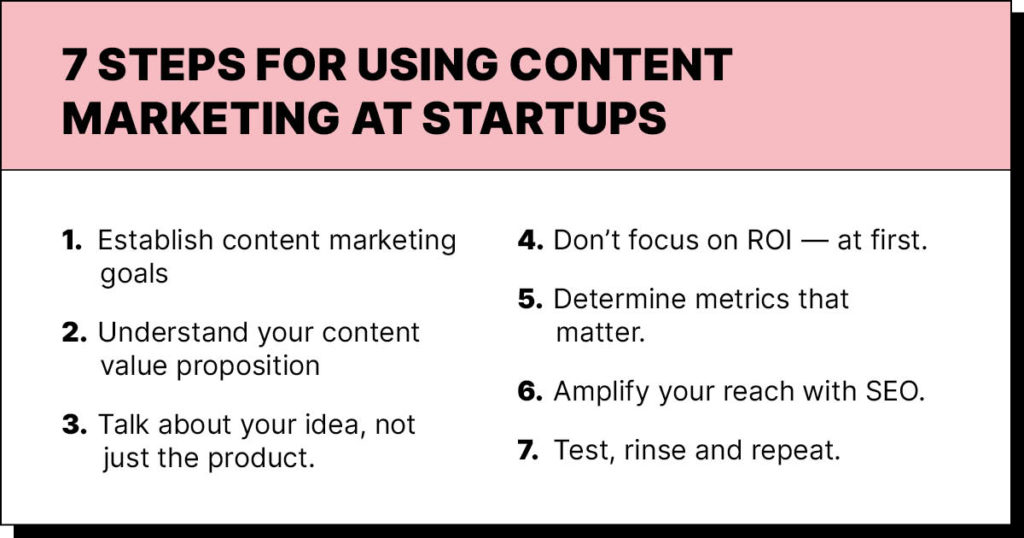Startups are experiments in risk. Their goal is to disrupt the marketplace and change the behavior of customers and investors. Content marketing for startups is especially important because it serves so many purposes. Whichever stage you’re at — wooing investors, seeking early adopters, building brand awareness or preparing to exit — content helps you stand out. Successful content marketing requires a complex mix of creativity, consistency and a willingness to pivot based on your learnings.
Learn about the content marketing needs of startups, why your needs change depending on the stage you’re in and how high-growth companies can use a content marketing strategy to build their brands.
Why Is Content Marketing Important for Startups?
Content marketing is as vital for startups as it is for enterprise organizations. When planned and executed properly, a successful content marketing strategy will:
- Create brand awareness and recognition.
- Feed each stage of the lead funnel.
- Support Google E.A.T. and user intent.
- Increase site traffic and conversions.
The numbers don’t lie. Recent statistics confirm the value of content marketing:
- 2022 content marketing revenue reached $66 billion. Experts predict it will double by 2026. [Statista]
- 81% of marketers consider content a core business strategy. [Content Marketing Institute]
- 64% of successful B2B marketers have a documented content marketing strategy. [Content Marketing Institute]
- 82% of marketers actively invest in content marketing. [HubSpot]
The bottom line? Content marketing is important for showcasing your value, achieving revenue growth and other organizational goals.
Why Startups Need Content Marketing
Startups span all industries, products and services while trying to gain awareness, get people to act differently and build market share. In many cases, startups spend precious capital on staffing and product development. Content marketing, particularly in bootstrapped companies, is a cost-effective way to communicate value while framing up a startup’s image.
“Content marketing for your startup assists you in developing a plan for communicating consistently with your target audience. You’ll be able to reinforce your messages and assist your consumers as they progress through the sales funnel,” says Kosy Office founder Yanis Mellata. “Remember that simply being noticed is not enough; your brand must also become recognizable to the general audience. You must be aware of your value proposition and how it matches their requirements, in addition to recognizing your brand.”
Content marketing can also attract investors because content creation and distribution showcase the solutions to customers’ wants and needs. The classic startup investor wants to make 10 times their investment. With a winning content marketing strategy, you’ll pique their interest level before your pitch deck and in-person conversations seal the deal.
Startup vs Small Business: Content Marketing Differences
To the average consumer, startups and small businesses may seem interchangeable. However, as an experienced content marketer, these distinctions can have a huge impact.
Startups develop and implement products or services that disrupt a specific market. Small businesses can be startups, but more generally, they are simply privately owned businesses, partnerships or sole proprietorships below a certain revenue threshold that differs by industry.
Both business models have a different set of stages. For startups, the stages include: early/infant, growth and late/exit. For small business, there are five stages: existence, survival, success, take-off and resource maturity.
The execution of startup content marketing is designed to create disruption, alter behaviors and scale the business as quickly as possible. Because of this, they may have to pivot on a moment’s notice and change their content marketing direction. On the contrary, small business content marketing leans more into traditional content marketing guidelines and best practices.
Both startups and small businesses develop a customer base and turn a profit, but the biggest difference is how they do it. In general, startups want to grow quickly. In terms of revenue, they need a long-term, dependable income stream to become profitable quickly.
With financing, both models can be bootstrapped or funded through outside sources. Small businesses don’t attract venture capital money, however. Additionally, they’re less likely to give away significant equity in exchange for funding.
Why Content Marketing Matters at Each Startup Stage
Every startup is unique in its processes, growth and goals, but they all follow a similar path from conception to exit. Here are three critical startup stages and how content marketing evolves during each.
Early- or Infant-Stage Startups
The “early stage” defines the developmental stage of every startup. In this stage, the focus is product development, market research and building a customer base. In many cases, startups are developing a minimum viable product.
“New businesses must go above and beyond to advertise themselves and obtain potential clients. Regardless of how amazing your product or service is, it will fail if you cannot reach your target audience,” says Yanis of Kosy Office.
Doing something during the early stage is better than doing nothing. Define your audience. Develop content that tells the story of your startup, your product(s), and a clear message about how you’re disrupting the market.
Mary Ellen Slayter, founder and CEO of Rep Cap, recommends testing your idea. “Write a blog post, write a social post, make a little guide. Start to test it out and see how people react. If you can’t sell it or get someone to read the blog post, you definitely can’t get them to buy the product.
Growth-Stage Startups
Growth-stage startups have achieved a degree of consistency in customers and income. They want to scale that growth and attract further funding to finance expansion. In addition to doubling down on selling the idea and product, startups in this stage want to show their unique value.
“At that stage, you’re still trying to sell an idea,” Mary Ellen says, “but now you’re trying to differentiate. Differentiate yourself, in many cases, against your competition. And your competition from the other products and services in the same space.”
Your competition isn’t necessarily other companies, she adds. “You’re fighting against the status quo and inertia. So now, you’re going to use your content to distinguish yourself from your competitors.”
What separates early and growth stages is that growth-stage startups have a more refined product with customers who have used it. “You’re getting leads, building awareness, but you can also use it to gain insights into what people care about the most,” Mary Ellen says. “What are they stressed out about? Make content about it!”
At this stage, startups add staff to create content and manage marketing. The focus is still more on making content and getting in front of audiences on various channels. Consider running deeper SEO analysis and content audits to understand your entire content ecosystem. Growth-stage startups are testing and refining content instead of demanding ROI.
“One of the biggest mistakes I see people make in stage one and two is they start trying to hold content accountable like a stage-three company would,” Mary Ellen says. “But if the numbers are too small, it doesn’t make sense to just kill it. Just write a blog post and leave it alone.”
Late-Stage/Exit-Stage Startups
Late-stage startups have reliable income streams, strategies and business objectives. They’re ready to be acquired or go public. With a bigger content focus (and budget), late-stage startups need a more mature approach to content marketing.
Early-stage startups need content to build awareness, and the specifics of that content strategy are arguably less important than having a successful production process. As startups mature into growth and late stage, they must be more strategic and targeted. It’s especially true as they focus on their ideal audience and learn which channels are effective at driving awareness and conversions — and which aren’t.
Internally, a mature content strategy has more formalized workflows, dedicated staffing (internal or external) and clear deliverables. Late-stage startups should use their content strategies to support a demand gen strategy.
“We got to get leads in the door and have content to send those leads to get them to sign. At that point, content is a critical piece of your whole demand-gen engine,” Mary Ellen explains. “At that stage — and it’s only at that stage — that I think you should start really putting pressure on people talking about the ROI of content.”
When content marketing supports demand gen, you can start investing more in marketing automation, paid social media posts, webinars and other activities that contribute to ROI. It’s at this point Mary Ellen says measuring your content’s impact makes more sense.
“You’re like, ‘Hey, we spent $20K to produce that guide and a quarter-million dollars on ads, but it led to $3 million in pipeline,’ you start having that conversation,” she says.

3 Examples of Good Content Marketing at Startups
These startup success stories show how you can leverage content marketing to drive awareness and your value proposition.
FreshBooks
An accounting software designed for small and medium-sized businesses, FreshBooks helps customers easily keep their books organized. As a competitor to Intuit’s QuickBooks, they realized how accounting software could be intimidating for new business owners. From the brand to the content to the software itself, FreshBooks created resources showcasing it as a fun, resourceful and effective way for small businesses and freelancers to manage their accounting.
FreshBooks focuses on being the company “where small-business owners learn to thrive.” The theme is reflected in customer case studies, ebooks and articles on topics that many solopreneurs and small business people find stressful, like creating contracts for freelancers.
Betterworks
Delivering solutions to maximize employee engagement, manager efficiency and business impact through marketing objectives and key results (OKRs) is at the core of the Betterworks model. Their robust content marketing strategy includes expert-led webinars, deeply researched and written articles, OKR how-to guides and online certifications through Betterworks University.
The Mom Project
The Mom Project is a digital talent marketplace and community connecting accomplished, underrepresented professionals with world-class companies. The startup has two sets of buyers: workers and employers. Content has to key in on one audience or the other while remaining aligned so that, for example, content targeted at employers doesn’t alienate workers or the company’s community.
The company succeeded by focusing content on people historically excluded from professional opportunities. The Study blog focuses on advice, best practices and other resources when that target audience is conducting job searches.
The Mom Project also hosts events like The ReCharge Summit the day after Mother’s Day. It uses content and thought leaders to connect job seekers and employers the company wants to attract. Blog posts, social content and video clips amplify the event’s reach and promote what The Mom Project can offer workers and employers.
How to Deploy Content Marketing at Startups
When executing a content marketing strategy at a startup, consider these tried-and-true tactics.
Establish Content Marketing Goals
Effective startup content marketing — just like general startup marketing — works best when there’s a set of defined objectives with which stakeholders can align.
At all stages, start by identifying your overarching content objectives. Do this by following the SMART goal framework:
- Specific: Focus on distinct areas.
- Measurable: Quantify progress indicator(s).
- Achievable: Reaching the desired results is realistic.
- Relevant: Show that it matters.
- Time-bound: Define when to expect results.
SMART is a straightforward method that helps develop a framework that empowers startups to:
- Create brand awareness.
- Attract new customers.
- Promote brand loyalty.
- Engage with customers.
- Educate existing and new customers.
Understand Your Content Value Proposition
Your product or service must prove its value and how it meets customers’ needs. This is called your content value proposition:
- Determine the main problem for your customers.
- Frame things up with subject matter expertise.
- Show how your expertise solves your customer’s problem.
- Explain your advantages.
- Distinguish yourself as a trusted consultant.
- Promote your differentiators.
To reinforce your content value proposition, messaging across all channels needs to be clear and concise. A message map is valuable for aligning go-to-market messaging and ensuring message consistency.
Talk About Your Idea, Not Just the Product
Obviously, startups need a viable product to go from hype to lasting business. But remember: product alone isn’t what wins people, especially in your content marketing.
“Don’t talk about your product; instead, talk about the idea underneath the product,” Mary Ellen recommends. “Use it to sharpen the focus, refine the content and spread it in the world!”
Don’t Focus on ROI Right Away
The main challenges for early- and growth-stage startups are generating awareness of their idea, product and brand. Granted, it’s difficult — and sometimes may feel impossible — to quantify or measure how that content directly translates to revenue.
Initially, your content may reach smaller audiences. You might not immediately find buyers who are ready to purchase. Worry about more ROI in the later stages, when you’re targeting the customers or late-stage investors you want most.
Determine Metrics that Matter
Content marketing has metrics for ROI at every startup stage. Use those metrics and think about how to tie results into standard startup metrics, such as:
- Compound monthly growth rate
- Gross margin
- Retention rate
- Burn rate
- Cash runway
- Customer acquisition cost
Amplify Your Reach With SEO
A high-level goal of content marketing is positioning your startup to stand out from the crowd. Embracing a search engine optimization (SEO) strategy — even a simple one — will complement your content marketing strategy efforts. The combination of strategies creates a powerful dynamic duo that will:
- Strengthen credibility.
- Reach more prospective customers.
- Provide a competitive advantage.
- Support online brand presence.
With the right SEO strategy that aligns with each phase of the buyer’s journey, you’ll see a path toward driving leads and subsequent conversions.
Experts say 51% of the content consumed online comes directly from organic search. It’s easy to see the value in adding SEO to your startup content marketing strategy.
Test, Test, Test. Rinse and Repeat
Your content will change as your brand and value proposition evolves. At a startup, how can you ensure your content grows with you? Run an A/B split test.
A/B split tests can unlock valuable data about your content-related theory or hypothesis. For example, an A/B test on content could compare which variation of copy performed best during the same time frame. These tests can be an inexpensive yet highly viable way to test your content, user intent and more.

An Intentional Strategy Leads to Growth
Startup content marketing doesn’t mean throwing out the playbook used by corporations and small businesses. You will need to create a strategy that meets your startup’s unique needs across each growth stage.
While startups aren’t afraid to spend early, they do need to scale quickly and sustain that growth as they mature. An adaptable content marketing strategy will evolve with every stage. It can lead to early awareness, later-stage customer acquisition and sustained business success.
Want to stay current on the latest and greatest in content marketing? Subscribe to the weekly Managing Editor Newsletter! Sign up now.






